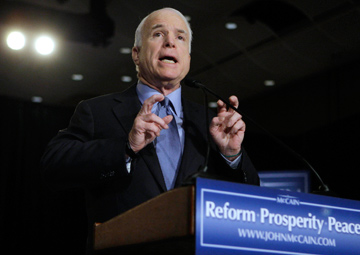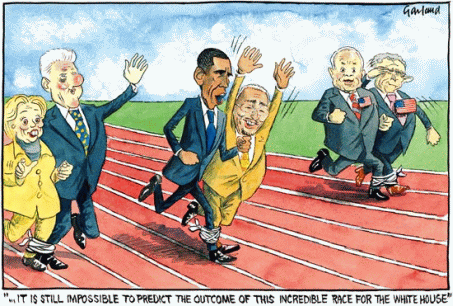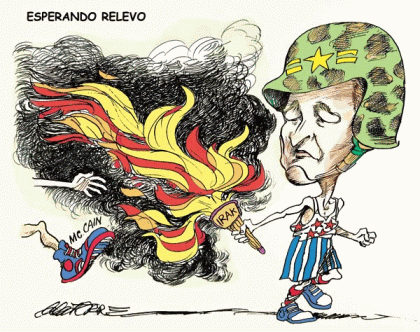
Bring it on? … Oh no, here we go
again …
Jornal de Negocios, Portugal
John McCain's
'Frightening' Strategy
"McCain's plans are
frightening in their incoherence, total lack of realism and underestimation of
economic and financial constraints. …It is a worrying state of the mind that animates
McCain in his desire to reform the world."
By João Carlos Barradas

Translated By Brandi Miller
April 30, 2008
Portugal
- Jornal de Negocios - Original Article (Portuguese)
A son and grandson of
admirals, a Navy pilot and a prisoner in Vietnam, John McCain says that he
"hates war" and is open to promoting democracy, "by defending
the rules of international civilized society and by creating the new
international institutions necessary to advance peace and freedom."
This statement is contained
in a March 26th speech before the Los Angeles World Affairs Council, and it
backs up the Republican candidate's ideas about "United States
leadership" in a world with multiple centers of democratic power, from
India to the European Union, and where the influence of countries like Russia
and China is growing.
The systematic explanation of
McCain's foreign policy goals was initially overshadowed by the dispute between
the Democratic candidates, but as the possibility of a Republican victory in
the November presidential election grows, so too does the difficulty in
discerning the strategic wisdom of the senator from Arizona.
THE MCCAIN 'LEAGUE'
McCain believes that the
dialogue with the Democratic partners of the United States obliges Washington
to adopt behavior in accord with constitutional values and, consequently, the
repudiation of "torture or inhuman treatment of detained terrorist
suspects."
The closing of the prison at
Guantánamo and negotiating with allies for "a new international
understanding" on the status of "dangerous detainees" is the
corollary of this laudable position of principle.
An old international
institution like the United Nations, however, can't be what McCain is referring
to when he argues for the reinforcement of "global alliances" with
Washington as "the core of a new global compact - the League of
Democracies."
The League is defined by
McCain as the "more than one hundred democratic nations around the
world" capable of "advancing our values and defending our shared
interests."
Another statement of
principle from McCain about U.S. involvement in negotiations to establish a
globally and "economically responsible" post-Kyoto system for
controlling greenhouse gas emissions is sufficiently broad to allow for any
kind of understanding.
The free trade agreement
established in 1994 between the United States, Canada, and Mexico is in turn
pointed to by McCain as an example to follow for prosperity in Central and
South America, and here the senator does better than the Democratic candidates.
Cuba wasn't mentioned in the
Los Angeles speech, but the candidate has said on other occasions that he
considered it impossible to alter the current "policy of containment"
until the island holds free elections and releases all political prisoners.
For McCain, the blockade of Cuba
is an example of successful political strategy because it allowed for the
elimination of Havana's influence in Latin America and Africa.
On another front,
transparency and respect for legality are two essential conditions for the
progress in the African states, according to McCain, who promises to continue
Washington's support in combating AIDS and eradicating malaria on a continent
where this indispensable foreign aid will help friendly countries.
AGAINST THE RUSSIANS
AND CHINESE
McCain's global strategy
concerns essentially excluding Russia from the G8 and including Brazil and
India.
Alongside this proposal, the
Republican candidate supports the enlargement of NATO to all democratic states
against the dangers of "a revanchist Russia." [A Russia seeking to
restore its former military and political power].
China is in turn considered
"a central challenge," and being a non-democratic state, Washington
will have to base its relationship with Beijing on "sporadic shared
interests."
McCain demands "more
responsible" behavior from China and that Beijing abandon attempts at
reach regional understandings and economic agreements that exclude the United
States from Asia [McCain is probably referring to the Shanghai Cooperation
Organization, which was invented by Beijing and Moscow to counter NATO  ].
].
The trade deficit with
Beijing and the Chinese investments in United States Treasury bonds receive no
special attention from McCain, who also lacks any perspective on reforming
institutions like the World Bank or the IMF.
Although he excludes Moscow
and Beijing from his League of Democracies and the G8, the senator, who
presents himself as a "realistic idealist," believes he can count on
Russian and Chinese cooperation to "halt and reverse nuclear
proliferation" and even to reduce existing arsenals.
In Los Angeles, McCain didn't
feel the need to elaborate on the successive statements in which he has
reserved the right, given the threat of outcast countries like North Korea and
strategic competitors like Russia and China, for the United States to develop
new anti-missile systems, including a military component in space.

[The Telegraph, U.K.]
NEITHER AUTOCRATS NOR
REALISM
In the strategic scenario
presented in California, Iran's nuclear weapons program, highlighted by McCain
as an intolerable risk that could justify a military strike, will be eliminated
thanks through the efforts of the "international community."
The "threat of radical
Islamic terrorism," being the most dangerous threat due to the risk
involved with weapons of mass destruction, requires in turn an,
"aggressive strategy of confronting and rooting out terrorists wherever
they seek to operate." McCain acknowledges that, beyond the use of
military force, it will be imperative to win the support of a majority of
moderate Muslim believers and create "international structures for a
durable peace."
To clarify his idea, McCain says
that order and stability in the Greater Middle East will not be secured through
"outdated autocracies," like, for example, the Saudi royal family,
the Pakistani generals or the leaders of Egypt, even though he admits it would
be undesirable, "to act rashly or demand change overnight" to reform
such regimes.
The Republican candidate
ignored the Israel-Palestine conflict in his Los Angeles speech, but his
well-known ambiguity on the issue is in order to keep all options open,
including the possibility of pressing the Jewish state to offer territorial
concessions to advance peace talks that exclude Hamas.
In the arc that goes from the
Middle East to Southeast Asia through Central Asia and the Indian subcontinent,
McCain identifies as "pillars for the construction of secure peace,"
democratic states like Turkey, Israel, India and Indonesia.
Iraq and Afghanistan,
however, emerge as the central elements in the "triumph of religious
tolerance," implying the pursuit of a war effort that has as its goal the
creation of "peaceful, stable, prosperous democratic states that pose no
threat to neighbors and contribute to the defeat of terrorists."

[Excelsior,
Mexico]
INCOHERENT AND
FRIGHTENING
McCain's plans are
frightening in their incoherence, total lack of realism and underestimation of economic
and financial constraints.
While partly inspired by the
thinking of the Republican realist school of international relations shared by
some advisers like Henry Kissinger and Richard Armitage, what gives the best
glimpse into McCain's strategic intentions is the interventionist and
confrontational neoconservative ideology of William Kristol or Robert Kagan.
John McCain, should he ever
be elected president, will be immediately subject to such a cold shower of
demands and afflictions that neither the creation of a League of Democracies or
the restructuring of the G8 will save.
Even before Beijing or Moscow
put the heat on the eventual Republican president, the apprehension of allies
in Berlin, Tokyo and Riyadh would be such that either McCain will have to
change course or he will condemn the United States to a proactive
interventionism capable of bringing even greater misfortune.
Posted by WORLDMEETS.US
It is a worrying state of the
mind that animates McCain in his desire to reform the world.
ELECTION FUN: 'McCain Bush Rap'
CLICK HERE FOR
PORTUGUESE VERSION
SEE ALSO ON THIS:
Diario Economico, Portugal
McCain is
the Best:
Three
Lessons from
the American
Race …
http://worldmeets.us/diarioeconomico000015.shtml
Estadao, Brazil
Brazilian
Assumptions
of a McCain
Victory
Premature,'
'Reckless' …
http://worldmeets.us/estadao000004.shtml
[Posted by WORLDMEETS.US May 6, 3:16am]